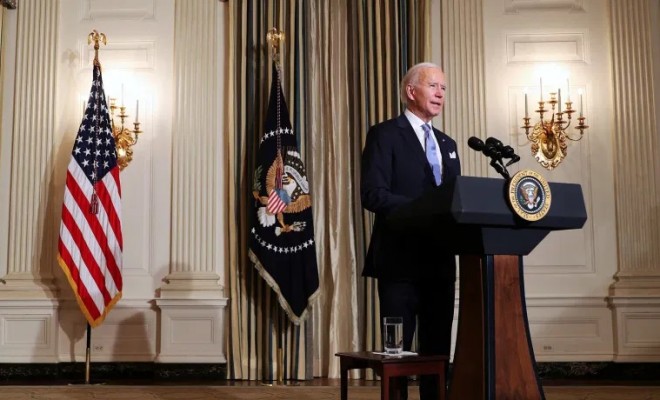
Biden’s first foreign policy speech
“America cannot afford to be absent any longer on the world stage,” President Biden declared this afternoon in his first foreign policy address since taking office.
The big picture: Speaking at the State Department, Biden argued that by emphasizing democratic values, recommitting to alliances and investing in diplomacy, the U.S. could rebuild its global leadership and outcompete China.
“We will repair our alliances and engage with the world once again, not to meet yesterday’s challenges, but today’s and tomorrow’s. American leadership must meet this new moment of advancing authoritarianism, including the growing ambitions of China to rival the United States and the determination of Russia to damage and disrupt our democracy.”
Biden’s speech included a handful of announcements and intentions:
- Raising the U.S. refugee capfrom 15,000 under Donald Trump to 125,000 in his first full fiscal year in office.
- Reviewing all U.S. forcesto assess whether America’s global military footprint aligns with its priorities. Biden added that he would stop Trump’s planned troop withdrawals from Germany.
- Holding a summit of the world’s democracies“early in my presidency.”
- Ending U.S. support for “offensive operations” in Yemen, including by ending “relevant arms sales” to Saudi Arabia and the United Arab Emirates and pushing for a ceasefire. He added that the U.S. would continue to help Saudi Arabia defend its territory, and he also announced career diplomat Timothy Lenderking as the new U.S. envoy for Yemen.
- Issuing a presidential memo to government agenciesto advance protections for LGBTQI people around the world.
Biden also addressed a few recent global developments.
- On the jailing of Russian activist Alexei Navalny:“He’s been targeted for exposing corruption. He should be released immediately and without condition,” Biden said.
- On the coup in Myanmar:Biden said the U.S. would work with international partners to “support the restoration of democracy and the rule of law and impose consequences on those responsible.”
- Biden said he’d been placing callsto America’s closest allies to begin “reforming the habits of cooperation and rebuilding the muscle of democratic alliances that have atrophied over the last few years of neglect — and I would argue, abuse.”
Two major challenges featured heavily in Biden’s speech: climate change and China.
- On climate,Biden said America had to raise its own targets in order to be able to push others to “up their ante.”
- On China,Biden said the U.S. would confront Beijing over its “economic abuses,” “coercive actions” and “attack on human rights, intellectual property and global governance.”
- But, he added, “we’re ready to work with Beijing when it’s in America’s interest to do so.”
The bottom line: As with the broader foreign policy challenges facing the U.S., Biden argued that the keys to confronting China would be getting America’s own house in order, working with allies, strengthening multilateralism and “reclaiming our credibility and moral authority, much of which has been lost.”
-How Macron sees the China challenge
While Biden was visiting the State Department, French President Emmanuel Macron was participating in an Atlantic Council forum on Europe’s role in the world.
Why it matters: He reiterated his call for European “strategic autonomy,” saying, “Our duty, definitely, is not to put ourselves in a situation to depend on a U.S. decision.”
It will disappoint some in Washington to hear Macron apply that framework to competition between the U.S. and China.
- If Europe and its partners pursue a strategy of “join all together against China,” Macron said, that will only cause China to “increase its regional strategy” and reduce its cooperation on global issues.
- But Europe also can’t treat China fully as a partner, on par with the U.S., because China is a systemic rival with Europe when it comes to values and geopolitics in the Indo-Pacific.
- Europe, then, must team up with the U.S. on certain issues, work with China where possible and “try to be the useful player to push China not to diverge anymore.”
He set out four priorities when it comes to China:
- Working with the permanent members of the UN Security Council to seek convergence.
- Cooperating with China on climate change.
- Strengthening protections for intellectual property and equitable trade.
- Challenging China on human rights.
More takeaways:
- On Russia,Macron reiterated his position that regular dialogue with Russia is important for Europe’s security, even as some colleagues seek to isolate Vladimir Putin.
- On Iran, Macron said he welcomed Biden’s desire for negotiations with Iran and said, “I will be here … to try to be an honest broker and a committed broker in this dialogue.” He added that Israel and Saudi Arabia should be brought in, and issues like ballistic missiles should be on the table.
Worth noting: Macron blasted social media networks for their decisions to “suddenly cut the mic” as soon as they were sure Donald Trump was leaving power. Go deeper.
Πηγή: axios.com




